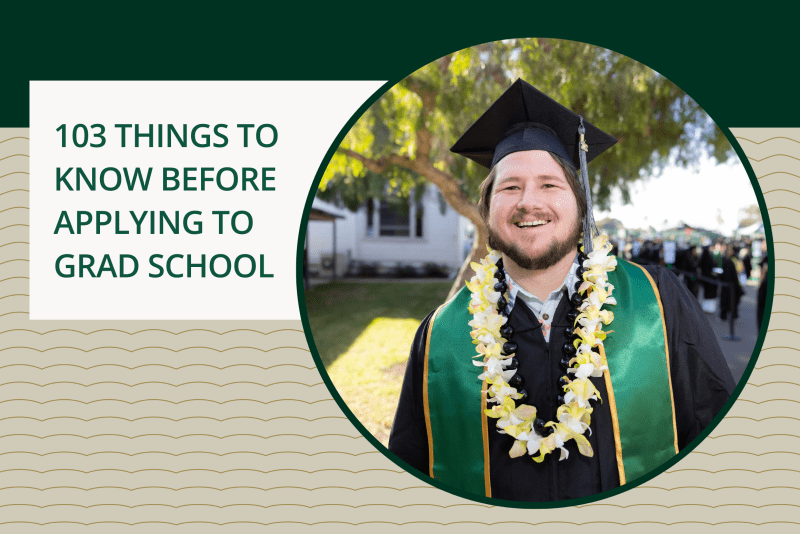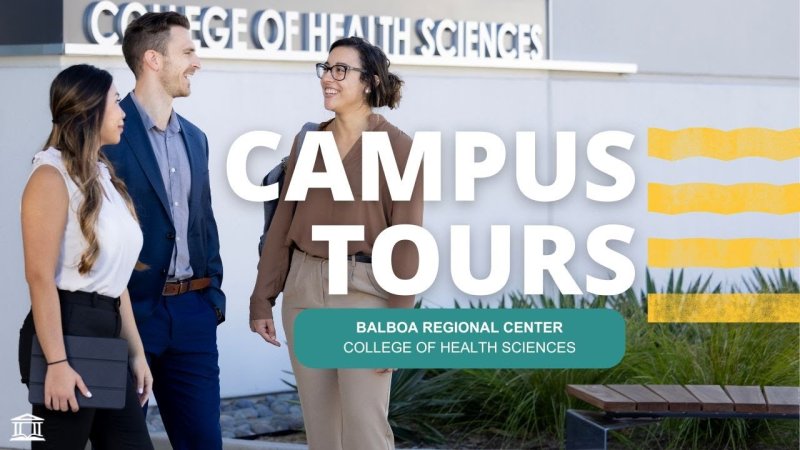
Furthering your education through graduate school is an excellent way to reach your career goals, move up to a higher position at work, and increase your salary. Some careers even require a graduate degree.
No matter the reason why you’re applying to grad school, make sure you’re asking the right questions to give yourself the best chance at success to apply and attend a post undergraduate program.
Below are 103 things to know before you apply and attend graduate school.
What to Think About Before Applying to a Graduate Program
1. Research the right program for you.
Yes, there are many different graduate school programs out there. Don’t let the number of options overwhelm you. Instead, start by taking a look at programs that interest you, are nearby, and that your friends may have attended. Then, expand your search to other options you qualify for.
When researching, you may come across different types of concentrations a program might offer. These can help you differentiate between a right and wrong fit. An MBA program that offers a concentration in entrepreneurship, for example, may be more appealing for your career trajectory than one that doesn’t offer this concentration.
2. Research if any prerequisites are required.
Some programs (not all) may require specific prerequisite classes, experience, or language ability as part of their application. Oftentimes, these prerequisites are required so programs know the cohort has a baseline understanding of a specific topic in order to thrive in the program.
While the majority of programs will, on average, require similar prerequisite requirements to be admitted, keep in mind not all programs will require the same prerequisites. They may fluctuate with the specific courses, work experience, or volunteer hours required to apply.
3. Take required prerequisite classes.
Take any classes you might be missing in order to apply for the program(s) you’re looking for (but make sure you only take classes you need). If the majority of programs you’re interested in require the same class you haven’t already taken before enrolling, consider taking that class at your local community college.
However, if only one program requires a class that you haven’t taken, it might not be worth the additional work to take a class just for one program. This decision depends on how much you want to attend that specific graduate school’s program. You have to assess your priorities and application timeline before committing to enrolling in a class.
Be cautious of taking a myriad of classes just to be able to broaden your application options.
4. Factor prerequisites into your application timeline.
If you have to take a prerequisite course or spend more time in the workforce in order to qualify for a graduate program, consider that in your timeline. You can still work on your application while completing the required elements of the program.
Keep in mind any additional classes you may need will likely take a semester to complete. Check your application deadline to see if you can meet prerequisites in time, or if you may need to aim for the next round of applications to submit a stronger and more qualified application.
5. Check if any of the required classes have an expiration period.
Some graduate programs require that prerequisite classes be taken within a certain amount of time of the application (i.e. five years). If you’re applying to a program a few years after completing your undergraduate degree, keep a look out for this caveat. If this applies to you, consider if you want to retake a class or apply to a program without this requirement.
For example, some physician assistant programs require students to have taken hard science classes within five years of their application. Don’t apply and receive a rejection because your classes missed the window of expiration.
6. Is there an admissions probationary period?
Some graduate programs accept students on "probation." This means the student is only accepted if they meet certain requirements like maintaining a certain GPA by a specific time or passing a prerequisite class. Applications accepted under probation aren’t fully enrolled unless they meet those requirements.
7. Consider your future goals — does the program align with what you want to do?
At the end of the day, a graduate program is supposed to support your future goals. In your research, you may find that a different program or path than you originally anticipated is better equipped to help you pursue your purpose. You can still pivot and find the next right step.
8. Read course descriptions to understand what you’ll learn and if the courses excite you.
The courses in your graduate program should excite you at some level! Are you excited to learn the subject material, or are you at least interested in it? A master’s-level degree will require research and writing in the subject to an extent. Will what you’re researching peak your curiosity, or are you uninterested?
9. Check out the required texts for the courses if possible and available.
If you can find out your courses’ required texts, you’re one step closer to understanding if you’d like the program. Are you excited to read, learn, and explore the concepts in your required reading materials?
10. Consider how long the program offered will be.
Most graduate-level programs take about two years to complete. However, the duration of a program depends on its area of focus and format. Think about the timeline and if it works well for you.
11. Waiting for the “perfect” time.
If you aren’t sure if you want to start a post-baccalaureate degree now, think about when you want to start it and what might be holding you back. The time is going to pass anyway, so maybe it’s worth starting now.
12. Understand the time commitment involved in pursuing a graduate-level degree.
Pursuing higher education will be a time commitment. You’ll have to dedicate time for:
- Classes — in person or online
- Studying
- Projects
- Extracurricular activities
- And more
Be prepared to prioritize these commitments. On average, graduate students can expect to spend about three times the amount of time in class on studying the material. For example, a 10-unit semester may require about 30 hours of studying per week.
13. Compare the pros and cons of each program.
A good pros-and-cons list can give you a visual of the positives and negatives different graduate programs have to offer. This list will help you narrow down the best programs for you to apply to. It may also help you evaluate what’s most important to you in a program.
14. What does the program offer that you value?
Your pros-and-cons list should help you determine what you value most in a graduate program. As you compile a running list of the things you’re looking for in your ideal post-graduate degree, you’ll soon realize what elements you can or can’t live without.
That could range from class size, post-graduation opportunities, internship opportunities, classes offered, networking opportunities, reputation, and more. In your research, you might be surprised by what you find!

15. What elements of a program are nonnegotiable?
Are you looking to enroll somewhere that has a smaller cohort size? Maybe you really want a program that’s flexible enough to complete while working a full-time job. Or, perhaps you want a strong mentorship program.
No matter what your nonnegotiable requirements are, make a full list of them so you can eliminate or include schools that meet your needs.
16. What elements of a program are you ok going without?
Something else to consider is if there are elements on your list that are perks but not necessarily nonnegotiable. If your ideal program offers the majority of what you’re looking for but is missing something you’d enjoy that isn’t a deal breaker, that option can still serve as a great place to apply.
17. Does the program offer a dual degree option?
Some programs offer a dual degree option. You can pursue both a bachelor’s degree and a master’s degree in less time than completing both separately. Typical programs that offer dual degree options will accelerate the program into five years of schooling instead of four years of undergraduate study and then two years in graduate school.
A popular dual degree option would be pursuing your bachelor’s degree in business while pursuing your MBA.
18. Some programs don’t require a thesis project while others do.
Make sure you know whether or not the program will require a master’s thesis. A thesis is a scholarly paper, usually due by the end of your program, that shows you’ve learned the skills and subject matter intended by the program. Most graduate thesis papers require extensive research, interviews, and time to put together.
However, not all programs require a thesis paper. Some schools offer a thesis or a non-thesis track. Depending on which you choose, it may affect the degree title you receive (like a Master of Science, M.S., or a Master of Arts, M.A.), but that isn’t always the case.
19. If a thesis project isn’t required, is there a comprehensive exam?
Non-thesis-required programs will typically require an alternative project, like a capstone project or a final cumulating exam, that allows you to demonstrate the skills you’ve acquired over your time in the program.
Know the answers to these questions ahead of time so you’re prepared for your academic course load before earning your degree.
This information is another great addition to your pros-and-cons list.
20. If applicable, is there an opportunity to study abroad during your program?
While not all programs offer graduate-level study abroad programs, some may do so if it’s beneficial to the program (i.e. international business or research program).
If you’re pursuing a degree that would benefit from an international experience, does your program offer enough resources and established connections to support you through that journey?
21. Will your program allow you to work (or not work) while you’re in school?
If working while going to school is important to you, make sure you find a program that allows you to do so, or at least communicates that you can. Oftentimes courses are rigorous, and working while attending classes isn’t beneficial (or encouraged).
22. Ask if the instructors are academics or practitioners (or a mix of both).
The type of professors you learn from can give you an idea of your academic environment. You may have a preference for the type of instructors you want to instruct your class, so research who your instructors will be.
23. Does your program offer research opportunities?
Similar to the study abroad section mentioned above, consider what research opportunities the program offers. Ask where the program’s research connections are located. Are they nearby? Do you have to travel (possibly out of state) to participate in those research opportunities?
If you’re earning a master’s degree that requires extensive research, how well will the program set you up for success?
24. How diverse are the cohorts?
Diversity is important in all aspects of life. Your graduate program is no exception. Finding programs that value diverse applicants will enrich your learning experience by learning alongside peers with different backgrounds, beliefs, experiences, and more. This will expose you to a variety of perspectives other than your own.
25. Budget for the cost of applications.
Each program you apply to may require an application fee. Applications can cost anywhere from $50 + per application. This can quickly add up if you plan on applying to multiple programs (another reason why it’s best to be selective on the programs you want to apply to in the beginning).
Some programs waive application fees. However, don’t assume you’ll receive a waived application fee. Talk to your academic advisor or research whether or not you qualify for any fee waivers.
26. Budget for the cost of an enrollment deposit.
Congratulations, you were accepted into a program! After celebrating, find out if you have to pay a deposit to accept your position in the program’s cohort. Programs typically require a deposit to confirm their enrollment and guarantee you’re accepting and planning on attending the program.
27. Does the program offer career support?
Support offered by programs while you’re in school is important. While you’re researching different schools, look into the extent of career support. This can include:
- An academic advisor
- A mentor
- Student support groups
- Writing centers
- Study groups
- Networking events
28. Does the program choose your class schedule for you? Or do you put that together yourself?
Ask your admissions counselor or students in the program how your class schedule will be created. Do you have the autonomy to craft your own schedule, or are you given a schedule each semester? This is something to consider depending on your lifestyle.
29. How applicable is the material?
Reflect on the following questions:
- How much will you be able to apply what you’re learning in the classroom to the work you’re doing right now?
- How can you maximize your opportunities to practice what you learn in school at your current (or future) job?
Graduate School Application Tips
30. What does the program’s enrollment period look like?
Unlike traditional undergraduate programs, graduate enrollment isn’t necessarily as predictable. Some programs offer enrollment multiple times a year while others only open once a year. Organize the timeline for when your application is due and when you need to start working on the materials to submit your application.
31. Think about your application timeline.
Once you know when your application is due, work backward to figure out how much time you have to work on the supplemental items. Don’t rush through the application process. Give yourself enough time to complete everything well.
Also, consider if you have enough time to complete the application. A well-completed application that isn’t missing important information will give you the greatest chance of receiving an acceptance letter.
If you’re missing a class or short on hands-on experience, consider completing those prerequisites first, and then applying for the next cohort. Doing so will strengthen your application and give you a higher chance of acceptance.
__________
Who are you called to be?
Pursue your purpose at PLNU.
__________
32. Be aware of all application and graduation deadlines.
Check if the program requires graduation deadlines you need to be aware of. Sometimes you can’t graduate without completing specific requirements laid out by the university. Some of those requirements could simply be applying online by a specific time or applying in conjunction with your thesis application.
It’s a good idea to be prepared for what the next few years of academia will look like before you start.
33. Are there graduation requirements/ milestones you must meet during your enrollment?
As mentioned above, some programs may require that you meet a certain requirement, like a thesis paper, in order to graduate with a master’s degree.
Other programs may not require you to meet milestones or submit applications or thesis papers in order to graduate.
Graduation milestones and requirements are excellent elements to include in your pros-and-cons list.
34. Does your application require a test like the GRE?
Many graduate programs require applicants to take a standardized test and submit the score as part of the application process. Programs will use standardized tests to assess if you’re prepared for graduate-level study.
Programs will clearly state what exams are required.
Double-check the requirements and speak with an admissions counselor about standardized test requirements. Some will waive the standardized exam requirement under certain circumstances.
Common graduate school standardized tests include:
- GRE: Graduate Record Examination
- GMAT: Graduate Management Admission Test
- LSAT: Law School Admission Test
- MCAT: Medical College Test
These exams are typically offered a few different times a year; some, like the GRE, are offered every day.
35. Update your CV or Resume.
Most graduate school programs require you to submit a curriculum vitae (CV) or a resume. The goal of a CV or resume is to provide the admissions counselor reviewing your application with a good understanding of your background, experience, and knowledge. It also helps them understand if you’re a good fit for the program.
This is a great place to highlight any volunteer work, experience, or programs you participated in that set you apart from other applicants (or that especially fall in line with the mission of the program). Lean into your strengths and the opportunities you’ve experienced that make you unique.
Here are tips to help you create a stronger resume.
36. Give yourself enough time.
Don’t rush through an application for the sake of having it in first, or to meet an extremely tight deadline. This increases your chances of missing errors, omitting important information, and not putting your best work forward. Give yourself enough time to write, review, and edit your entire application (and give those writing you letters of recommendation ample time to do so).
Sometimes you need to take a step away from your application and look at it again with fresh eyes to adjust anything. Having the time to do so will aid you in submitting a well-thought-out application.
If you have to submit an entrance exam, make sure you give yourself enough time to study for that exam. Taking the GRE cold can set you back in time and money if you have to take it over again for a better score.

37. Write your application essays thoughtfully.
This is your time to show the program why you want to earn a graduate degree in your chosen field. Do so thoughtfully. Think about how your answer can stand apart in a pile of applications.
A big part of being able to do this is taking the above tip and giving yourself enough time to write and reflect on your answer. Rushing through writing your essay may hinder you from putting well-organized thoughts on paper.
38. Ask trusted sources to edit your writing samples.
Editing is important! A first draft is called a first draft for a reason. Ask trusted sources around you to proofread your writing samples. They’ll be able to give you a fresh perspective, and most likely catch anything you haven’t already fixed. These trusted sources may even be able to shed light on areas you can expand more on that you haven’t thought of.
After a few rounds of editing, your original writing sample may look a little different than the one you end up with. And that’s okay!
39. Read and review your application (at least) twice before submitting it.
Proofread your application before submitting it. And then do it again. Be thorough and catch any potential mistakes before you submit it. A clean and well-compiled application increases your chances of receiving an acceptance letter from the program you spent so much time researching and applying to.
40. Prepare for an interview.
Some programs may require an interview as part of the application process to gain a better understanding of who you are outside of your submitted test scores and application.
If you’re invited to an interview, make sure you prepare ahead of time.
- Anticipate and prepare possible answers to questions they may ask.
- Have a good understanding of what their program offers.
- Know why you want to enroll.
- Understand why you would be a good fit.
- Be yourself!
Scholarships and Finances
41. Research scholarships.
You don’t necessarily have to pay for a master’s degree tuition on your own. While you’re researching different programs, look at different scholarship opportunities from the program and outside of the program as well. You may be surprised by the resources you find.
42. Apply for the right scholarship.
Apply for scholarships you have a chance at winning. Research scholarship requirements to see if you meet the criteria they’re looking for.
Some scholarships may ask you to provide transcripts, letters of recommendation, personal statements, or projects as part of the application process. Think about whether or not you have the time you have to complete the requirements.
In addition to supplemental pieces for your application, different scholarships may ask you to meet requirements such as:
- Meeting a certain GPA.
- Completing volunteer hours.
- Having a military association.
- Coming from a certain ethnic or cultural background.
- And more.
Some scholarships are only eligible for applicants pursuing a specific field in order to qualify (like the Teacher Education Assistance for College and Higher Education (TEACH) Grants).
Make sure you meet all of the requirements before spending time on an application.
43. Look into FAFSA.
The Free Application for Federal Student Aid (FAFSA) is a form that individuals pursuing a college or graduate degree in order to determine what type of student financial aid they’re eligible for. Filling out the online application should take you less than an hour.
Once you create an account, you’ll need to provide personal identifiers such as:
- Your name (as it appears on your social security card)
- Birthday
- Social security number
For a full list of what you’ll need to fill out the application, visit the FAFSA website here.
44. Research if the program offers merit-based scholarships or tuition assistance.
Some programs may offer a merit-based scholarship or tuition assistance for qualified applicants. Some are merit-based and others are need-based. Make sure to check which options are available to you.
The deadlines for scholarship applications may be different than the deadlines for the program itself, so make sure you’re aware of any scholarship application deadlines well in advance.
45. Consider other financial aid options the program may offer.
Scholarships aren’t the only way you can help fund your grad-school experience. While researching different programs or speaking with an admissions counselor, ask if there are opportunities to become a teaching assistant (TA), student research assistant, etc. to aid with extra funds or receive possible tuition discounts.

46. Compare the costs of the different programs.
Once you’ve researched the different programs and honed in on the few you want to apply to, compare the cost of each one. This may help you with your pros-and-cons list mentioned earlier. How expensive one program is compared to another can play a large role in where you apply and where you accept an offer from.
47. Consider if the investment is worth it.
Calculate the amount of money you’ll need to invest into your grad program vs. the average income you can receive after earning your degree. Once you’ve done that, ask yourself, “is it worth it?” For some, the cost is worth it because it means pursuing a lifelong dream, increasing lifetime salary, and more. For others, it may not be. NerdWallet explains, “nearly two-thirds (61%) of graduates with a master’s degree will earn more than the median bachelor’s degree holder …”
More times than not, pursuing a post-baccalaureate degree opens the door to more opportunities, higher salaries, and a wide range of connections.
48. Research any additional fees that might not be covered in tuition.
The cost of tuition itself is important to consider when picking a graduate school program. However, tuition itself isn’t the only cost you should consider. Factor in other potential additional costs such as:
- Living expenses
- Housing
- Parking permits
- Technology (i.e. laptop or programs you need to install)
- Health insurance
- Textbooks
- Attire (i.e. scrubs or business wear)
- School supplies
- Lab fees
Letters of Recommendation
49. Ask for letters of recommendation well in advance.
Many applications will request letters of recommendation. Just like how you need time to write your application essay responses, those you ask to write your letter of recommendation will need time as well.
While there isn’t a standard timeframe to ask for a recommendation letter, the earlier in advance you ask, the better. Best practice is to give the person you’re asking about three to four weeks’ notice before the letter is due.
You’re most likely asking faculty and staff members to write these letters for you. They’re also busy and likely working on other projects or written letters of recommendation. Give them ample time to do so, and to write the best recommendation they can.
50. Ask for two-three letters of recommendation.
Some programs will specify how many letters they require and who they require them from. For those with looser requirements, try to stick to about two or three letters.
51. Ask for a letter of recommendation from those you know will speak highly of you.
You should ask a diverse range of people who know you well and can speak highly of you in their recommendation. They should be able to speak well about you, your character, and your ability to complete this program well. Ideally, ask someone who you have known for a long time or has seen you work hard or be a leader at work or in an activity/extracurricular. Remember not to ask family members to write these letters for you.
Common people to ask for a letter of recommendation from include:
- Professors
- Coaches
- Mentors
- Supervisors
52. Provide a resume or a bulleted list of accomplishments to give to the people you ask for a recommendation letter.
The resume or CV you created for your application is a great resource to give to those you’re asking to write a letter of recommendation. It aids in helping them also get a broader picture of your experience and accomplishments while also refreshing their mind on experiences you may have together.
Remember that the people writing your letters of recommendation are most likely also busy. Make their job easier by giving them the information readily available when they sit to write your rec.
Location and Environment
53. Consider what environment you want to be in.
How do you want to experience graduate school? Ask yourself what you want out of the program and what you’re open to experiencing. This could range from geographic location to type of learning environment to the types of peers you’re seeking to surround yourself with.
54. How do you feel about the location of the graduate program?
If you enroll somewhere that requires in-person classes or at least a hybrid class, do you mind where it’s located? Consider whether or not you mind moving to the city and state where you’re applying.
Maybe you’re looking forward to a change in climate, like sunny San Diego. Or maybe moving to a city with constant snow in the winter might not be the best fit for you. Use geography as another option to weigh the pros and cons of your list of grad programs.
Learn more about how to thrive in San Diego’s mid-sized company market here.
Also consider the city’s main method of transportation. Do you need a car to get around? Is it easy to use public transportation? Is it in a walkable location?
Depending on where you study, you may have access to different professional connections. Research what kind of connections are available in your program’s region.
55. Do you want an in-person graduate program?
Some programs offer fully in-person classes or labs. If you love the idea of working and learning alongside your peers and professors, this will be a great option for you.
Keep in mind that committing to an in-person program will require you to be more flexible with your work schedule. There are some in-person graduate programs that are catered to individuals who seek a graduate degree while also working a full-time job.
56. Do you want a hybrid graduate program?
Hybrid programs work well for students looking to participate in some scholastic activities at home while also participating in person. You’ll still most likely need to live in the city where your program is located, but you won’t have be on campus as often. This usually allows for more flexibility with scheduling your own personal life, work, and school.
57. Do you want a fully online graduate program?
A fully online program gives the flexibility to work on your own time. It’s a great option for individuals looking to complete a graduate program while also working a full-time job.
Online formats require a level of accountability to stay on top of your classes, workload, due dates, and collaboration with peers or professors.

58. If the program is online, how often and how long are the enrollment periods?
An online degree is typically completed at your own pace. However, some online courses may have specific enrollment periods throughout the year. You may have a certain amount of time to enroll in a class and complete a course.
Look into how long you have to enroll, how often the program accepts new students, and program start dates. There may be one start date each year, or there may be multiple.
59. What is the cost of living where the program is located?
If you enroll in a fully in-person or hybrid program, what’s the cost of living where you’ll be living? If you have to move, can you afford housing in a new city? These questions can help you determine how feasible attending a program will be.
Is it located in a city where you can realistically live? The cost of living to attend a graduate program in San Diego is different than a graduate program in Salt Lake City.
60. Does the program offer housing or housing resources?
If you’re moving to a new city or state to complete your graduate degree, research if the program offers housing for students or different types of housing resources. Some programs may have a certain amount housing set aside for graduate students while others don’t. If the program doesn’t offer housing, ask about resources to help you find housing or a roommate.
61. What timeline does the program follow?
Research if the program follows a quarter, semester, or a different timetable entirely. Knowing these details ahead of time can help you understand what your schedule will look like.
62. Are there clubs or organizations the school has that you can or want to get involved in?
Learn about what life outside of the classroom is like. See what opportunities the school offers to partner with your peers to get involved where you’re passionate. Ask if there are clubs or activities you can get involved with.
Connect With the School’s Network
63. Reach out to professors in the programs.
One of the best ways to find out about how classes are structured and the program’s expectations is by speaking to or emailing the professors who actually teach the classes.
64. Ask your admissions counselor questions you have about the program.
Another excellent resource is your admissions counselor. Part of their job is to be able to answer your questions and guide you to the right sources to help you further.

65. Ask professors or your admissions counselor for sample syllabi if available.
At the beginning of every class, students typically receive a course syllabus that outlines the subjects and materials the course will cover. Understanding expectations of the classes offered gives a good indication of class workload and teaching styles. It can also help you understand if you’re excited about the material or not.
66. Reach out to students in the programs.
Who better to ask about a program than the students currently enrolled? They’ll have the freshest insight into the application process and ins-and-outs of life as a graduate student in their particular program.
67. Talk to current students about class availability.
When you speak with current students, ask them about class availability. Is it easy to register for the classes you need?
68. Ask how the program will set you up with internships or job opportunities during your program.
Real-life experience is important. Does the program have established connections within the community and beyond to set you up for internships or job opportunities that will develop your skills?
Some programs, potentially newer ones, may not have as many established connections and may lean more on your proactivity to find your own internships and job opportunities.
69. What kind of networking opportunities do they offer?
Networking is important. It helps you:
- Meet people in the industry you want to work in (or paralleled industries).
- Establish a good reputation for yourself.
- Develop relationships.
- And much more!
Make sure you ask your admissions counselor, professors, and students in the program what type of networking opportunities the program offers. Do they provide ways for you to network with others in your field? Or do you need to find those opportunities yourself?
Alumni Network
70. What is the alumni network like?
The program’s alumni network is an invaluable resource you can tap into. Look into what the network looks like from a vocational and geographical standpoint. Are most alum local or have they spread across the country/globe?
Most schools have a link to an alumni network on their website, so be sure to include that when doing your research.

71. Research where recent alumni are working now or where they have worked in the past.
Try to find any patterns of where alumni of the program end up after graduation. Many may end up working in the same field or for a type of company you are looking to also work in.
72. Connect with alumni on LinkedIn.
Use a professional platform like LinkedIn to connect with different alums of the program. They may be willing to share their experience or tips with you, and may even offer potential connections into the future.
Looking to optimize your LinkedIn profile and become more discoverable? Watch our webinar.
73. Ask to get coffee or chat with an alum.
Alums have first-hand experience, so take advantage of asking how they applied and thrived during their program. Chat about how they felt their program prepared them for life after graduation. Did they feel equipped to pursue their career goals?
74. What kind of alumni networking events are available?
Research if the program has established alumni networking events or opportunities for their students.
Organization
75. Get a planner — tangible or electronic, whichever works best for you.
Stay organized from the start. Forming good habits early on will help you stay on top of your schedule during the flurry of graduate school and avoid missing important deadlines. If you’re not sure what type of planner works best for you try a few different options.
Tangible planners are a fun way to be creative and organize your written thoughts without adding more screen time to your day.
If you like the convenience of an electronic planner you can access on your phone or laptop, try that method. Google Calendar is a great app to help organize your schedule, add reminders, and block off studying time.
76. Set up a Google Drive folder.
Another invaluable tool is Google Drive. Setting up a Google Drive folder(s) dedicated to your graduate school application — and later your graduate school program — will help you stay organized. It also reduces the storage you take up on your actual computer or laptop.
Categorize your folder(s) in whatever way makes the most sense to you and will be easy to find in the future. Some sections you can include are:
- Letters of recommendation
- Essays
- Supplemental pieces
- Research
- And more
You may even try organizing your folder(s) by grad school.
Using Google Drive isn’t only helpful for the application process; it’s a great tool to continue using during your graduate program as well.
An alternative to Google Drive is creating organized folders on your desktop.
77. Block off time during your day for homework and studying.
Time blocking is one of the best ways to maximize the efficiency of your day. Block off time in your day for homework, research, studying, and more. Then stick to it.
Don’t forget to set little rewards for working through the time you blocked. That can be giving yourself a little break from studying by taking a quick walk, baking your favorite treat, or watching a quick episode of a show.
Depending on what your day looks like, as well as your study style, you can craft a time-blocked schedule to maximize efficiency.
For example:
- 8 a.m. to 12 p.m.: class time
- 12-1 p.m.: lunch with peers
- 1-1:30 p.m.: meeting with a professor about thesis project
- 1:30-3:30 p.m.: researching thesis project in the library
- 4-5:30 p.m.: study group for midterm exam next week
- 5:45-6:45 p.m.: gym
- 7-7:45 p.m.: dinner
78. Use “Do Not Disturb.”
Distractions are everywhere, especially when we feel the urge to procrastinate. Seeing a social media notification or a text message come through on your phone can distract you from your workflow.
Turn airplane mode or “do not disturb” on your electronic devices to avoid the temptation of seeing a distracting notification or text. If you’re worried about missing an important message, you can configure your notifications to still go through for specific people.
Maybe even try putting your phone in another room. Out of sight, out of mind.
79. Take advantage of office hours.
Use your professor’s office hours! They set aside time to be available to students for a reason. Don’t hesitate to meet with a professor to answer your questions.
80. Take advantage of student resources.
Most programs offer student support in a variety of ways. It could be extended library hours, career counseling, mental health support or counseling, tutorial centers, writing centers, and more. Lean into the different opportunities available to you.
81. What are you going to take out of your schedule and life to make room for school?
As the adage goes, “saying yes to one thing is saying no to something else.” Adding a graduate program to your schedule will mean shifting around your daily life. This could mean less travel, TV time, or even pausing work for the time being.
Before you start school, think about what in your life right now might have to go in order to meet the time commitment required by school. How can you make your new schedule sustainable during your graduate degree?
82. Create a vision board.
A vision board serves as a great visual reminder of your goals, dreams, and aspirations. When you’re in the thick of your graduate program, your vision board will serve as a reminder of why you’re doing what you’re doing.
Understand Your Learning Style
83. What’s your learning style?
There isn’t one learning style that works for everyone equally. In fact, there are four main types of learning styles:
- Visual
- Auditory
- Reading/Writing
- Kinesthetic
Understand how you learn best, and use that as a strategy to start out strong.
84. Try different learning styles.
Once you know the type of learning style you work best with, use that to your advantage. Don’t be afraid of using a different type of learning method during your studies, however. Sometimes changing things up can help.
85. Form study groups with your peers.
Study groups are invaluable! When you study with peers in your classes, you’re more likely to retain and understand the information by discussing course material, teaching each other, filling in any missing gaps, and holding each other more accountable.
Lean on the Support of Others
86. Don’t be afraid to ask for help.
Your post-undergraduate degree isn’t something you should tackle alone. Let those around you support you as you pursue your dreams. It’s okay to ask for help and support!

87. During school, get support from your peers.
There’s arguably no one who understands how you’re feeling in your graduate program better than the peers in your class. Don’t be afraid of leaning on them for help as well. That can look like forming study groups (as mentioned earlier) or asking for advice on a project.
88. Get support from your professors.
Your professors want you to succeed and understand the material they’re teaching. If you’re struggling with concepts or have questions, reach out to your professors. Utilize their office hours to clarify any concepts you’re not confident with or send them an email.
89. Get support from family, friends, and your community.
Although family members, friends, and your community may not be taking the classes with you, they can serve as great support systems outside of the classroom walls. This can look like helping you meal prep for the week, helping you study for an exam, proofreading any written assignments, supporting your mental health, or aiding as cheerleaders along the way.
90. Know when to say no!
With so much added to your plate, you don't have to say yes to everything life throws at you — don't feel guilty about this either! Assess your schedule and set healthy boundaries to avoid burnout.
91. Combat Imposter Syndrome.
Don’t let imposter syndrome hold you back from reaching your goals. You are capable! Meet any feelings of imposter syndrome with affirmations that you’re qualified and meant to be where you are.
Affirmations to Remind Yourself of During Grad School
92. I can do hard things.
93. I’m in the right place, at the right time, and doing the right thing.
94. Strive for effort, not perfection.
95. The days are long, but the years are short. When it's tough, remember: this too shall pass.
96. The future you will thank you for every tough day you put in now.
97. It’s okay not to know everything. My ability to learn grows more each day.
98. I can succeed even in stressful situations.
99. I’m an excellent student.
100. Focus on the important things and what’s in your control, and let go of the rest.
101. The mistakes I made yesterday are creating the person I’ll be tomorrow.
102. My best is enough; my work is enough; I am enough.
103. I am capable and I am qualified! I got this!
Take the Next Step
Ready to apply these tips yourself? Browse the different San Diego graduate school programs offered at Point Loma Nazarene University. We offer a variety of options to help you pursue your purpose.


